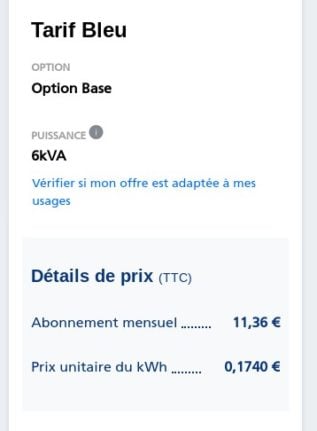Reader Question: Why did my French electricity bill increase by more than 4%?

The French government has capped electricity prices rises at four percent - but as with many French rules, there are certain exceptions.
Question: I read in the media that electricity prices in France are capped at four percent, but I just got a letter from EDF telling me that my bill is going up by almost 20 percent - is this a mistake?
The French government’s bouclier tarifaire (tariff shield), froze gas prices at 2021 levels and capped electricity price hikes to four percent - it remain in place until at least the end of 2022.
However, there are some customers who will see increases to their bills of more than that - here's why:
The regulated tariff rate
The French government involvement in price-setting doesn't just happen during periods of energy crisis, normally regulated tariff prices are updated twice a year: usually on February 1st and August 1st.
Typically, this value is calculated by the CRE (commission de régulation de l'énergie) and it is based on several different factors, which are explained on this government website. These tariffs proposed by the CRE are then subject to approval by the ministers in charge of energy and the economy.
READ MORE: EXPLAINED: Why are French energy prices capped?
These affect the state-owned Engie (formerly Gaz de France), the mostly state-owned EDF and some local distribution companies. Around 70 percent of people in France get their electricity from EDF but other suppliers do exist in the market.
These alternative suppliers, like Direct-Énergie, Total Spring or Antargaz, are free to charge more - but don't usually charge much above the EDF rates for obvious commercial reasons.
Basic rate
The government-set limit in price rises refers only to the basic rate (option base) for electricity.
This plan represents over 80 percent of the 32 million households connected to the electricity grid in France. So, there is a good chance you might be subscribed to this without even realising it.
If you are on the basic tariff rate, your bill will not increase by more than four percent this year.
Other tariff options
However, other options for electricity bills do exist, including off-peak rates, green deals and fixed energy prices for a certain period.
Typically people who sign up for these will have been paying less for their electricity in the preceding months than those on the base rate.
However, there are certain special deals that are not covered by the four percent cap, and some users will find that their deal period has come to an end, they are then shifted onto the base rate - which is likely to represent a price increase for them of more than four percent.
It's little consolation when faced with rising bills, but you will likely have been paying significantly less than customers who have been in the base rate for the past few years.
READ MORE: French government to continue energy price freeze until at least 2023
Kilowatt price
Because most electricity price plans are bafflingly complicated, the easiest way to compare is to look at the price per kilowatt-hour.
Your electricity bill consists of a fixed part, the monthly subscription (abonnement) and the variable part, which depends on the quantity of electricity consumed (in euro per kilowatt-hour, kWh). The latter part is what is concerned by the tariff shield of four percent.
Here is an example of what that might look like:

The mid-August base rate price per kilowatt-hour is €0.1740/ kWh, so if you're with EDF they cannot charge you more than this rate.
Other EDF plans charge significantly less than that - for example the Vert Electrique Weekend deal has been charging €0.1080/kWh on weekends and €0.1434/kWh on weekdays.
Bill rises
With the tariff shield, the average resident customer on the base rate will see a €38 rise on their bill this year, while professional customers will see an average of €60 rise.
Without the tariff shield, electricity prices per residential (non-business) customer would likely have increased an average of €330 a year, according to the CRE.
Comments
See Also
Question: I read in the media that electricity prices in France are capped at four percent, but I just got a letter from EDF telling me that my bill is going up by almost 20 percent - is this a mistake?
The French government’s bouclier tarifaire (tariff shield), froze gas prices at 2021 levels and capped electricity price hikes to four percent - it remain in place until at least the end of 2022.
However, there are some customers who will see increases to their bills of more than that - here's why:
The regulated tariff rate
The French government involvement in price-setting doesn't just happen during periods of energy crisis, normally regulated tariff prices are updated twice a year: usually on February 1st and August 1st.
Typically, this value is calculated by the CRE (commission de régulation de l'énergie) and it is based on several different factors, which are explained on this government website. These tariffs proposed by the CRE are then subject to approval by the ministers in charge of energy and the economy.
READ MORE: EXPLAINED: Why are French energy prices capped?
These affect the state-owned Engie (formerly Gaz de France), the mostly state-owned EDF and some local distribution companies. Around 70 percent of people in France get their electricity from EDF but other suppliers do exist in the market.
These alternative suppliers, like Direct-Énergie, Total Spring or Antargaz, are free to charge more - but don't usually charge much above the EDF rates for obvious commercial reasons.
Basic rate
The government-set limit in price rises refers only to the basic rate (option base) for electricity.
This plan represents over 80 percent of the 32 million households connected to the electricity grid in France. So, there is a good chance you might be subscribed to this without even realising it.
If you are on the basic tariff rate, your bill will not increase by more than four percent this year.
Other tariff options
However, other options for electricity bills do exist, including off-peak rates, green deals and fixed energy prices for a certain period.
Typically people who sign up for these will have been paying less for their electricity in the preceding months than those on the base rate.
However, there are certain special deals that are not covered by the four percent cap, and some users will find that their deal period has come to an end, they are then shifted onto the base rate - which is likely to represent a price increase for them of more than four percent.
It's little consolation when faced with rising bills, but you will likely have been paying significantly less than customers who have been in the base rate for the past few years.
READ MORE: French government to continue energy price freeze until at least 2023
Kilowatt price
Because most electricity price plans are bafflingly complicated, the easiest way to compare is to look at the price per kilowatt-hour.
Your electricity bill consists of a fixed part, the monthly subscription (abonnement) and the variable part, which depends on the quantity of electricity consumed (in euro per kilowatt-hour, kWh). The latter part is what is concerned by the tariff shield of four percent.
Here is an example of what that might look like:

The mid-August base rate price per kilowatt-hour is €0.1740/ kWh, so if you're with EDF they cannot charge you more than this rate.
Other EDF plans charge significantly less than that - for example the Vert Electrique Weekend deal has been charging €0.1080/kWh on weekends and €0.1434/kWh on weekdays.
Bill rises
With the tariff shield, the average resident customer on the base rate will see a €38 rise on their bill this year, while professional customers will see an average of €60 rise.
Without the tariff shield, electricity prices per residential (non-business) customer would likely have increased an average of €330 a year, according to the CRE.
Join the conversation in our comments section below. Share your own views and experience and if you have a question or suggestion for our journalists then email us at [email protected].
Please keep comments civil, constructive and on topic – and make sure to read our terms of use before getting involved.
Please log in here to leave a comment.